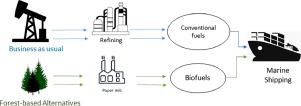Resources, Conservation and Recycling ( IF 13.2 ) Pub Date : 2021-07-05 , DOI: 10.1016/j.resconrec.2021.105763 Dalia M.M. Yacout , Mats Tysklind , Venkata K.K. Upadhyayula

|
International shipping in the Arctic region is one of the key contributors to changes in the region due to the generated air emissions from marine fuels combustion, usage of forest-based biofuels as an alternative to conventional fossil fuels in marine shipping seem as an attractive alternative. However, a system analysis perspective is needed to ensure its sustainability.
Life cycle assessment was used to estimate the environmental impacts of the production and use of two forest-based biofuels. These fuels, biodiesel and bioethanol, were derived from pulp and paper mills for use by marine shipping. They were compared to fossil fuels currently used by the marine shipping industry, those being Marine Gas Oil (MGO) and Heavy Fuel Oil (HFO). Future projection scenarios in 2030 and 2050 for estimating the environmental impacts of a transition from fossil fuels to biofuels in Arctic shipping were studied as well.
The results indicate that a holistic view is very important for biofuel use. The production and use of forest-based bioethanol (BE) had a significantly lower impact on climate change (CC) potential, but had a higher impact on Human toxicity non-cancer effects (HTX), Human toxicity cancer effects (CE), Particulate matter (PM), Photochemical ozone formation (POF), Acidification potential (AP), Terrestrial eutrophication (TE), Freshwater Eutrophication (FE), Marine eutrophication (ME) and Freshwater Ecotoxicity (FEC). Replacing HFO with forest-based biodiesel reduced the potential AP by 55%. It also had a lower impact on the categories CC, PM, POF, TE, ME and FEC. Furthermore, a reduction in emissions generated by shipping in the Arctic and a better overall environmental performance can be achieved by using blends of MGO with BE.
中文翻译:

评估用于北极海运的森林生物燃料
由于船用燃料燃烧产生的空气排放,北极地区的国际航运是该地区变化的主要贡献者之一,在海上航运中使用基于森林的生物燃料作为传统化石燃料的替代品似乎是一种有吸引力的选择。但是,需要从系统分析的角度来确保其可持续性。
生命周期评估用于评估两种基于森林的生物燃料的生产和使用对环境的影响。这些燃料,生物柴油和生物乙醇,来自纸浆和造纸厂,供海运使用。它们与海运业目前使用的化石燃料进行了比较,这些化石燃料是船用瓦斯油 (MGO) 和重燃料油 (HFO)。还研究了 2030 年和 2050 年的未来预测情景,用于估计北极航运从化石燃料向生物燃料过渡的环境影响。
结果表明,整体观点对于生物燃料的使用非常重要。森林生物乙醇 (BE) 的生产和使用对气候变化 (CC) 潜力的影响显着较低,但对人类毒性非癌症效应 (HTX)、人类毒性癌症效应 (CE)、微粒的影响更大物质 (PM)、光化学臭氧形成 (POF)、酸化潜能 (AP)、陆地富营养化 (TE)、淡水富营养化 (FE)、海洋富营养化 (ME) 和淡水生态毒性 (FEC)。用基于森林的生物柴油代替 HFO 将潜在 AP 降低了 55%。它还对 CC、PM、POF、TE、ME 和 FEC 类别的影响较小。此外,通过使用 MGO 与 BE 的混合物,可以减少北极航运产生的排放量和更好的整体环境绩效。



























 京公网安备 11010802027423号
京公网安备 11010802027423号